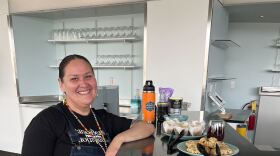WUWM is partnering with the Milwaukee Journal Sentinel, Milwaukee PBS, and the Milwaukee Public Library on an initiative called Listen MKE. The goal is to help Milwaukee’s north side residents get the information they want and need.
More specifically, we want to understand what’s most important to people who live in these Milwaukee neighborhoods and help fill information gaps.
The latest Listen MKE was hosted by Milwaukee Journal Sentinel columnist James Causey. It focused on his project Milwaukee’s Promise, reporting that looks at solutions to some of the nagging issues the city is facing. One part of the project was a call for vision boards from residents.
Here's a look at six community leaders' vision boards and their hopes for the city’s future:
Jeremy Triblett
Jeremy Triblett is the founder of Anapto Training and Presentation Design, an organization dedicated to helping teachers, speakers, and facilitators improve their teaching environments.
He created a diorama of a city that focuses on anti-poverty measures to help bring equitable resources across Milwaukee.
“We know that for a long time, [Milwaukee] has been considered the worst place to raise a Black child,” says Triblett. “A part of it is many African American families exist in poverty and that a lot of us don’t actually have a lot of resources that are being distributed with equity. So, I wanted to highlight that in this continuum of conversation and say, ‘you know what, our goal should be the safest place to raise Black children’.”

Natalie Hayden
Natalie Hayden is the co-host of ExPOSED The Podcast, which focuses on discussing life after abuse.
The throughline of Hayden's board is accountability. From poor health outcomes to housing disparities, she believes the focus needs to be on holding people in Milwaukee accountable.
“There’s a level of accountability that you have to hold yourself, as well as these individuals that hold these high places,” says Hayden. “It’s not just one person, and it’s not just one person who can do the job. It’s many of us that have been gifted to ensure the vision continues to move forward.”

Camille Mays
Camile Mays is a community activist, advocate and community organizer. One organization that she works with is the Peace Garden Project MKE.
A key idea in her vision board is who has the money. She wants community organizers and groups to receive real funding and not just expect people to show up out of the goodness of their hearts.
“A lot of times the city or big organizations call us to the table, they often use our intellect, they often use our ideas, but we’re not compensated. And they tell people to just go work and just go do stuff, but they have no idea how many hours and how much time and how many people are contacted, and how big community organizers' hearts are. I always say the people with the passion don’t have the funds and the people with the funds don’t have the passion,” says Mays.

Imani Ray

Imani Ray is a youth engagement specialist at the Peak Initiative, which builds leadership-focused, social and emotional learning skills as young people move into adulthood. She also owns a clothing line called Natural “E” Beautiful.
For her vision board, she asked people on social media what they love about Milwaukee in hopes of replicating the greatness the city offers.
“There are some great things in Milwaukee, so how can we duplicate greatness,” says Ray. “I think about places like the Sherman Fields and how amazing and how much of a staple that space has been for our city.”
Montell Ross
Montell Ross is a medical research associate for the Medical College of Wisconsin’s Center for AIDS Intervention Research, co-chair for Wisconsin’s HIV planning group, and male drag performer in Milwaukee.
His vision board takes on the form of a game show because he says, “Everyone will not be able to play inside this movement, but everyone is going to want their opportunity to spin the wheel.”
His wheel focuses on bringing families together whether it’s through a women’s movement, COVID-19, or the Black Lives Matter movement. He says these events from 2020 are going to shape the future of 2021.

Venice Williams
Venice Williams is the executive director of Alice’s Garden and an urban minister.
Her vision board harks back to the city of Pittsburg where she grew up, the city in America with the most bridges. For her, the bridges represent people from all over the world coming together.
“As we’re looking in this moment that we are in, it’s a moment of opportunity, no matter how we choose to see it. Yes, we’re in a moment of crisis and transition and change in 2020 but more than anything, we should see this a solutions-driven moment,” says Williams.







